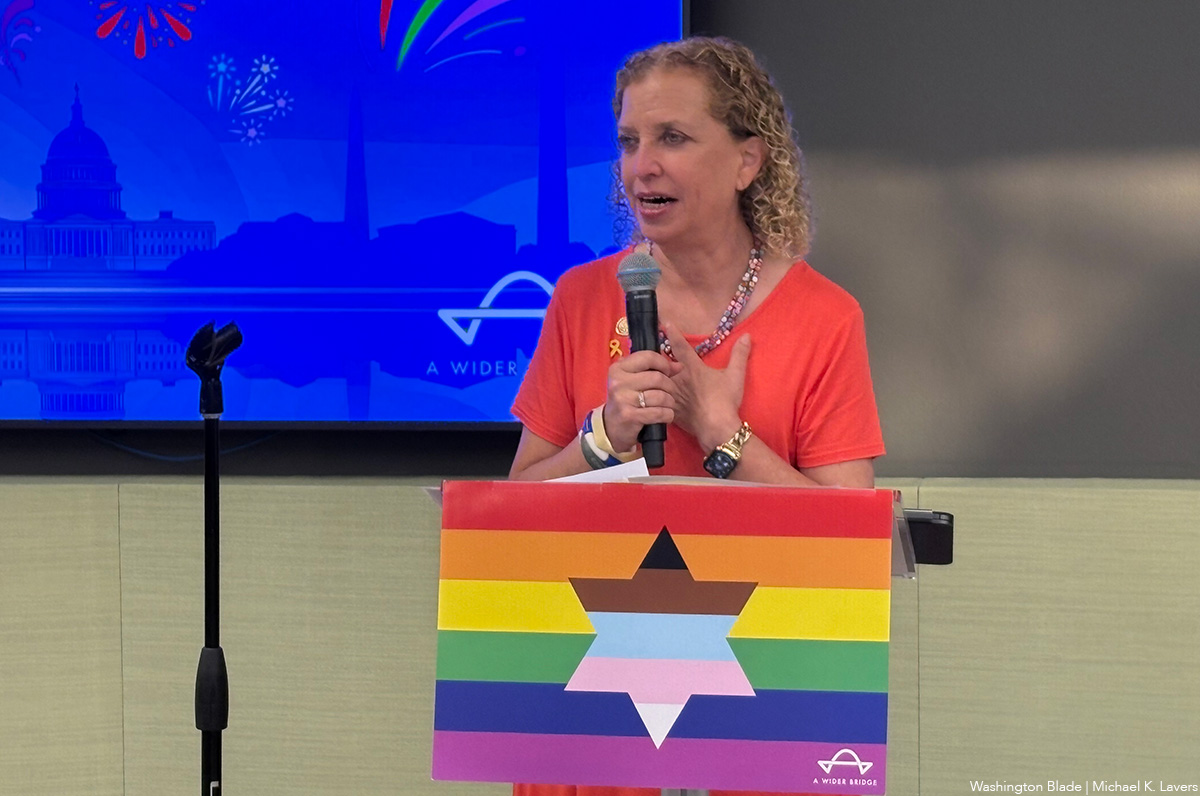Congress
Wasserman Schultz: Allies must do more to support LGBTQ Jews
A Wider Bridge honored Fla. congresswoman at Capital Jewish Museum on Thursday

Florida Congresswoman Debbie Wasserman Schultz on Thursday said allies need to do more to support LGBTQ Jewish people in the wake of Oct. 7.
“Since Oct. 7, what has been appalling to me is that LGBTQ+ Jewish organizations and efforts to march in parades, to be allies, to give voice to other causes have faced rejection,” said the Florida Democrat at the Capital Jewish Museum in D.C. after A Wider Bridge honored her at its Pride event.
Wasserman Schultz, a Jewish Democrat who represents Florida’s 25th Congressional District in the U.S. House of Representatives, added the “silence of our allies … has been disappointing.”
“It makes your heart feel hollow and it makes me feel alone and isolated, which is why making sure that we have spaces that we can organize in every possible way in every sector of our society as Jews is so incredibly important,” she said.
The Israeli government says Hamas militants on Oct. 7, 2023, killed roughly 1,200 people, including upwards of 360 partygoers at the Nova Music Festival, when it launched a surprise attack on the country. The militants also kidnapped more than 200 people on that day.
The Hamas-controlled Gaza Health Ministry says Israeli forces have killed nearly 55,000 people in the enclave since Oct. 7. Karim Khan, the International Criminal Court’s chief prosecutor, has said Israeli Prime Minister Benjamin Netanyahu and former Hamas leader Yahya Sinwar, who the Israel Defense Forces killed last October, are among those who have committed war crimes and crimes against humanity in Gaza and Israel.
A Wider Bridge is a group that “advocates for justice, counters LGBTQphobia, and fights antisemitism and other forms of hatred.”
Thursday’s event took place 15 days after a gunman killed two Israeli Embassy employees — Yaron Lischinsky and Sarah Milgrim — as they were leaving an event at the Capital Jewish Museum.
Police say a man who injured more than a dozen people on June 1 in Boulder, Colo., when he threw Molotov cocktails into a group of demonstrators who were calling for the release of the remaining Israeli hostages was yelling “Free Palestine.” The Associated Press notes that authorities said the man who has been charged in connection with the attack spent more than a year planning it.
Congress
Congress passes ‘Big, Beautiful Bill’ with massive cuts to health insurance coverage
Roughly 1.8 million LGBTQ Americans rely on Medicaid

The “Big, Beautiful Bill” heads to President Donald Trump’s desk following the vote by the Republican majority in the U.S. House of Representatives Thursday, which saw two nays from GOP members and unified opposition from the entire Democratic caucus.
To partially offset the cost of tax breaks that disproportionately favor the wealthy, the bill contains massive cuts to Medicaid and social safety net programs like food assistance for the poor while adding a projected $3.3 billion to the deficit.
Policy wise, the signature legislation of Trump’s second term rolls back clean energy tax credits passed under the Biden-Harris administration while beefing up funding for defense and border security.
Roughly 13 percent of LGBTQ adults in the U.S., about 1.8 million people, rely on Medicaid as their primary health insurer, compared to seven percent of non-LGBTQ adults, according to the UCLA School of Law’s Williams Institute think tank on sexual orientation and gender identities.
In total, the Congressional Budget Office estimates the cuts will cause more than 10 million Americans to lose their coverage under Medicaid and anywhere from three to five million to lose their care under Affordable Care Act marketplace plans.
A number of Republicans in the House and Senate opposed the bill reasoning that they might face political consequences for taking away access to healthcare for, particularly, low-income Americans who rely on Medicaid. Poorer voters flocked to Trump in last year’s presidential election, exit polls show.
A provision that would have blocked the use of federal funds to reimburse medical care for transgender youth was blocked by the Senate Parliamentarian and ultimately struck from the legislation — reportedly after the first trans member of Congress, U.S. Rep. Sarah McBride (D-Del.) and the first lesbian U.S. senator, Tammy Baldwin (D-Wis.), shored up unified opposition to the proposal among Congressional Democrats.
Congress
Ritchie Torres says he is unlikely to run for NY governor
One poll showed gay Democratic congressman nearly tied with Kathy Hochul

Gay Democratic Congressman Ritchie Torres of New York is unlikely to challenge New York Gov. Kathy Hochul (D) in the state’s next gubernatorial race, he said during an appearance Wednesday on MSNBC’s “Morning Joe.”
“I’m unlikely to run for governor,” he said. ““I feel like the assault that we’ve seen on the social safety net in the Bronx is so unprecedented. It’s so overwhelming that I’m going to keep my focus on Washington, D.C.”
Torres and Hochul were nearly tied in a poll this spring of likely Democratic voters in New York City, fueling speculation that the congressman might run. A Siena College poll, however, found Hochul leading with a wider margin.
Back in D.C., the congressman and his colleagues are unified in their opposition to President Donald Trump’s signature legislation, the “Big Beautiful Bill,” which heads back to the House after passing the Senate by one vote this week.
To pay for tax cuts that disproportionately advantage the ultra-wealthy and large corporations, the president and Congressional Republicans have proposed massive cuts to Medicaid and other social programs.
A provision in the Senate version of the bill that would have blocked the use of federal funds to reimburse medical care for transgender youth was blocked by the Senate Parliamentarian and ultimately struck from the legislation, reportedly after pressure from transgender U.S. Rep. Sarah McBride (D-Del.) and lesbian U.S. Sen. Tammy Baldwin (D-Wis.).
Torres on “Morning Joe” said, “The so-called Big Beautiful Bill represents a betrayal of the working people of America and nowhere more so than in the Bronx,” adding, “It’s going to destabilize every health care provider, every hospital.”
Congress
House Democrats oppose Bessent’s removal of SOGI from discrimination complaint forms
Congressional Equality Caucus sharply criticized move

A letter issued last week by a group of House Democrats objects to Treasury Secretary Scott Bessent’s removal of sexual orientation and gender identity as bases for sex discrimination complaints in several Equal Employment Opportunity forms.
Bessent, who is gay, is the highest ranking openly LGBTQ official in American history and the second out Cabinet member next to Pete Buttigieg, who served as transportation secretary during the Biden-Harris administration.
The signatories to the letter include a few out members of Congress, Congressional Equality Caucus chair and co-chairs Mark Takano (Calif.), Ritchie Torres (N.Y.), and Becca Balint (Vt.), along with U.S. Reps. Nikema Williams (Ga.), Hank Johnson (Ga.), Raja Krishnamoorthi (Ill.), Delia Ramirez (Ill.), Joyce Beatty (Ohio), Lloyd Doggett (Texas), Eleanor Holmes Norton (D.C.), Josh Gottheimer (N.J.), and Sylvia Garcia (D-Texas).
The letter explains the “critical role” played by the EEO given the strictures and limits on how federal employees can find recourse for unlawful workplace discrimination — namely, without the ability to file complaints directly with the Employment Opportunity Commission or otherwise engage with the agency unless the complainant “appeal[s] an agency’s decision following the agency’s investigation or request[s] a hearing before an administrative judge.”
“Your attempt to remove ‘gender identity’ and ‘sexual orientation’ as bases for sex discrimination complaints in numerous Equal Employment Opportunity (EEO) forms will create unnecessary hurdles to employees filing EEO complaints and undermine enforcement of federal employee’s nondiscrimination protections,” the members wrote in their letter.
They further explain the legal basis behind LGBTQ inclusive nondiscrimination protections for federal employees in the EEOC’s decisions in Macy v. Holder (2012) and Baldwin v. Foxx (2015) and the U.S. Supreme Court’s decision in Bostock v. Clayton County (2020).
“It appears that these changes may be an attempt by the department to dissuade employees from reporting gender identity and sexual orientation discrimination,” the lawmakers wrote. “Without forms clearly enumerating gender identity and sexual orientation as forms of sex discrimination, the average employee who experiences these forms of discrimination may see these forms and not realize that the discrimination they experienced was unlawful and something that they can report and seek recourse for.”
“A more alarming view would be that the department no longer plans to fulfill its legal obligations to investigate complaints of gender identity and sexual orientation and ensure its
employees are working in an environment free from these forms of discrimination,” they added.
-

 U.S. Supreme Court3 days ago
U.S. Supreme Court3 days agoSupreme Court to consider bans on trans athletes in school sports
-

 Out & About3 days ago
Out & About3 days agoCelebrate the Fourth of July the gay way!
-

 Virginia3 days ago
Virginia3 days agoVa. court allows conversion therapy despite law banning it
-

 Federal Government5 days ago
Federal Government5 days agoUPenn erases Lia Thomas’s records as part of settlement with White House












